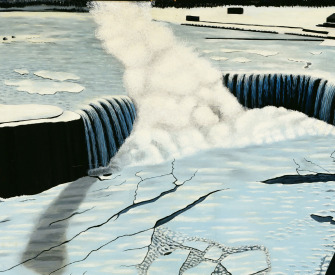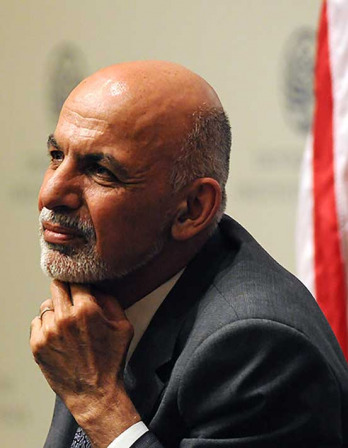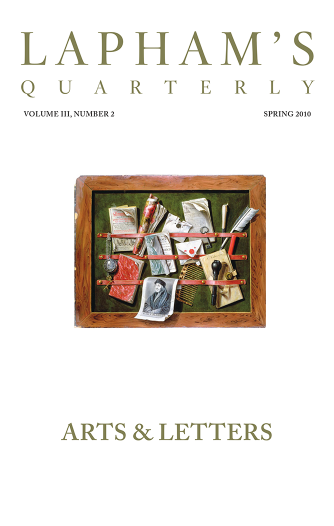The fear of war is worse than war itself.
—Seneca, 50Storm Warning
Are there meaningful parallels between America today and late imperial Rome, and will they suffer a similar fate?
By Caleb Carr
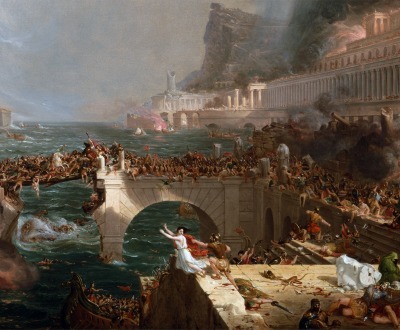
The Course of Empire: Destruction, by Thomas Cole, 1836. New-York Historical Society, New York, NY.
An American failure in Iraq may well be the prelude to a type of conflict that has very rarely been seen, not merely during the last century or few centuries, but during the last fifteen hundred years. Even the World Wars, with their horrifying death tolls and political as well as economic costs, may pale in comparison to the unraveling of the post–World War II international order—possibly the first result of the consistent inability of current American leaders to grasp in a timely fashion what has actually been taking place, not only in Iraq, Afghanistan, and the Muslim world generally, but in every arena of global affairs. Like any other war, the American struggle against Islamist extremism is not occurring in a vacuum. Other forces are bearing down on the United States that may fatally erode not only American, but global security and cohesion, aggravating the destructive potential of an expanded Western-Muslim confrontation, and in turn being aggravated by such a widened conflict.
The first of these larger forces is population migration. At the moment, we are witnessing very rare movements of entire communities and even populations throughout the world, nearly all of them driven by the repeated failures of various national economies, as well as by political corruption and religious intolerance. In the Western Hemisphere, for example, the pervasive inefficiency and corruption of governments in nations ranging from Mexico to Argentina—aggravated, as always by the exploitative, even predatory practices of U.S. multinational corporations—is fueling what the news media has termed an “immigration crisis” in America.
The planetary environment, meanwhile, long under assault by agricultural and industrial practices that have been woefully short-sighted and mercenary, is causing physical disasters—ruined harvests, hurricanes and other catastrophic storm systems, mudslides, and wildfires. America has been responsible for much of the atmospheric poisoning that, it is now generally agreed among scientific experts, is seriously and perhaps fatally accelerating those already bizarre shifts in climatic cycles that have contributed so heavily to such natural disasters abroad and at home.
At this moment, when we are challenged by a potentially destabilizing war in the Middle East, population shifts on every continent, and severe environmental deviations throughout the world, it may be time to look for similarly cataclysmic historical moments in global history in order to see if mankind met them any more successfully in the past; or, if it did not, to determine what circumstances might have been changed to effect a happier outcome.
Should the worst-case scenario concerning our Iraq invasion actually materialize; that is, should the entire Middle East become destabilized as increasing parts of the Muslim world are seized by extremist religious regimes, all of whom band together to pursue the forceful establishment of an expansionist Islamic caliphate throughout the world (which was, as most experts who minimize the current Islamist-jihadist threat tend to forget, the goal of the original Muslim armies in the seventh and eighth centuries—a goal they came within one or two decisive battles of achieving), then it would represent a shift in global power and populations such as we have not seen since the fourth and fifth centuries, the era of “The Invasion of Europe by the Barbarians,” as the famous early-twentieth-century Anglo-Irish scholar of the period, J.B. Bury, pronounced it.
It is in this example—Europe at the outset of the Barbarian Age—that we encounter a shift in global power, a mass migration of populations, and, quite probably, a series of environmental crises (and even pandemics) that fully echo the present historical moment. Taken together, these factors changed the world in much the manner that stands to happen today if our radical Islamist enemies will not or cannot reach a mutually satisfactory compromise with the West and the rest of the developed world. For their parts, should the industrialized and polluting states of the world—led by America, China, and India—refuse to undertake measures to allow the atmosphere of our planet to begin to heal, and if the increasing economic inequity that accompanies the phenomenon known as globalization is not brought under control, we could very easily enter a new international dark age, one characterized by massive exterminations of life and the breakdown of what is left of international economic and political order.
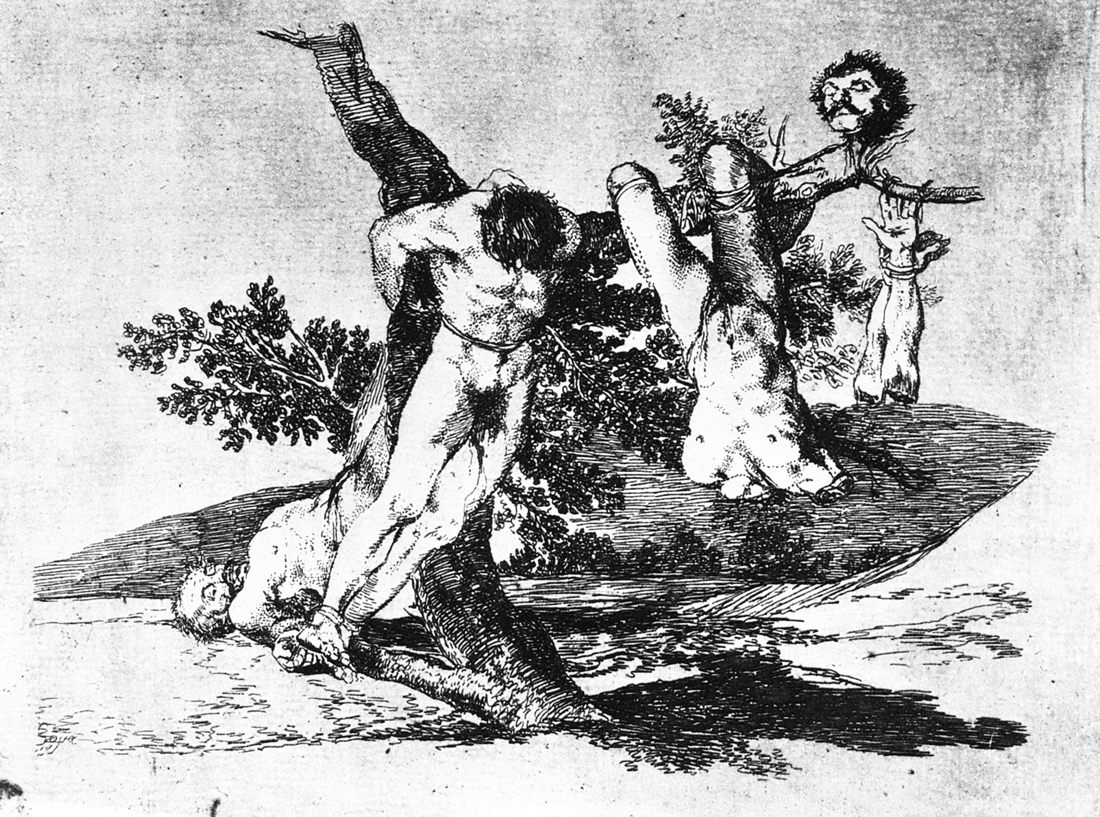
Heroic Feat! Against the Dead!, from The Disasters of War, by Francisco de Goya y Lucientes, 1814. Prado Museum, Madrid.
Cullen Murphy, in his insightful study Are We Rome?, warns of both the dangers of repeating many of Rome’s mistakes and of over-identifying our own position with that empire’s. “Are we Rome?” he ultimately asks. “In important ways, we just might be…. But the antidote is everywhere. The antidote is being American.” Before we can conclude whether or not “being American” is in fact an adequate or even a possible solution to our current international and environmental dilemmas, it would behoove us to note the important ways in which we are not like the Rome that found itself on the losing end of the fourth- and fifth-century barbarian invasions. Not only does the United States exert more types of influence throughout the actual world than Rome did over what its leaders considered the “known” world, but Rome was a dramatically more brutal state than is America. There are also more countries today that claim they are ready to step in and ensure Western political stability and security—should the United States undergo a Rome-like collapse—than there were kingdoms ready to assume the full obligations of Roman imperial power in the fifth century.
Many of these objections are wise and well-founded, yet no historical comparison can ever achieve precision; and the fact remains that, should the United States suddenly become a second- or third-tier global power (a very real possibility, if it cannot resolve the ills that currently plague both it and the world over which it exerts such influence), there is every chance that those nations of Europe who claim the ability to take the lead in the West, assuming they have not already suffered the same fate as the United States, will experience just such crises largely because of our decline. Either way, tyranny, religious fundamentalism of all varieties, and would-be usurpers of regional power around the world will all receive enormous shots in the arm.
Yet this may actually pose less of a long-term threat to the economic, military, and environmental stability of the world than would several other consequences of a critically weakened America: economic crisis in China caused by a heavy reduction in demand for manufactured goods on the part of its principal trading partner; the emboldening of post-Soviet Russia, which is currently displaying dangerous signs that it is reverting to the brutal, warlike authoritarianism and international unreliability of the tsarist Russian Empire; and the intensification of population fluctuations, including genocidal ethnic cleansings such as the one we are currently witnessing in the Darfur province of Sudan.
There are further reasons to take seriously a comparison between a prospective modern American decline and that of the western region of the Roman empire of the fourth and fifth centuries. These reasons are far more substantive and manifold than have been indicated by the popularized, clichéd notions about inevitable American “imperial decline” that have been kicking around for most of the last forty years. These more serious comparisons go beyond the shared pressures of unwise military adventures and large-scale population migrations on both U.S. and Roman borders. There are crises of internal strength and order to be considered as well, and—perhaps even more importantly—there are similarities between the calamitous state of the global physical environment during the two periods.
As in late imperial Rome, the upper classes of today’s America have virtually divorced themselves (with some noteworthy exceptions) from the actual dirty work of preserving and projecting American economic and military power abroad.
Service in the U.S. military, voluntary since the end of the Vietnam War, now attracts the children of very few educated, upper-middle- and upper-class American families. Similarly, young Romans of those same classes had ceased, by the time of the western portion of the empire’s collapse, to view military service as especially incumbent upon them. The reasons for this latter condition have often been debated, with some analysts saying it was facilitated by the increased participation of barbarian auxiliary troops and officers, and others arguing that it was the degeneracy of those same upper class Roman youths that made them avoid such service. Whatever the case, the empire’s upper classes, once a source of its most vigorous leaders, had become largely useless and parasitic by the late fourth century, and the empire’s armies were filled out by foreigners who not only achieved citizenship through their service, but who also rose to high ranks. Indeed, in its twilight, the greatest generals of Rome were almost all “barbarians” by birth or descent.
The parallels here with the modern United States are more than academically amusing. As America increasingly treats first- and second-generation immigrants—some of them illegal and receiving a fast track to citizenship through their military service—as a deep and reliable pool of military recruits, and while the children of well-to-do American families who have been here for generations go on failing, year after year, to gain even basic historical competence in secondary schools and colleges, the analogy becomes genuinely alarming. The attitude of those privileged young people, who, given their privileged status, we have every right to expect to form the next generation of American leaders, continues to deteriorate into hollow echoes of the radicalism of the 1960s at best and unabashed hedonism at worst, thereby reinforcing the comparison with fourth-century western Rome to a point where it is nearly precise, in both its essential characteristics and its effects on the rest of the world.
This consideration of the paths that, on the one hand, legal and illegal immigrant youths in the United States are taking toward advancement, contrasted with how native, privileged youths are choosing to enter adult society may seem trivial, perhaps even laughably dismissible, to some; it is anything but. Many of the barbarian tribesmen who sought first a place and then advancement in the Roman legions did so out of both practical need and out of a genuine desire to belong to what they had always perceived, from the perspective of the far banks of the Rhine and Danube rivers, to be a great and functional state, one that could protect them from the vagaries of tribal existence, in which they were at the mercy of radically capricious weather patterns and the migration of new, almost nihilistically destructive tribes heading their way from eastern Asia, particularly but not exclusively the Huns. There were, however, other barbarian recruits who had future mischief against Rome on their minds when they went looking for a military education in the legions. Once they achieved rank and power within those imperial units, not a few of these foreign auxiliaries either turned on their masters, inciting mass mutinies, or returned home to teach their own tribesmen how to fight their way into Roman lands in order to set up new communities and kingdoms, thus eroding imperial borders irrevocably.
In considering these various activities of desperate foreigners on Roman borders in the late imperial period, what may be most important for the United States is the misperception that the Romans themselves formed about the nature of the tribes they faced and about what those tribes wanted from them. Because the tribes could, ever since the legendary uprising of Arminius (a Germanic tribesman-turned-Roman officer-turned-insurgent leader), cause serious military problems for Rome, the historians of the empire began to compose rhapsodic but highly speculative myths about the nature and origins of the “barbarian hordes”—especially the Germanic hordes, and particularly the Goths, who were said to have originated in Scandinavia, to have spent hundreds of years migrating and fighting their way south to the Black Sea, and thence into Europe, eventually populating all that continent’s principal regions, outside of the young kingdom, and later republic, of Rome.
The great problem with this tale—which would become pseudohagiography in Victorian Europe, especially among admiring British authors and German historians and politicians seeking a definitive cultural identity for their new empire—is that it may well be largely fiction, created as something of a rationalization. The Romans fought the various Germanic tribes, especially the several Gothic peoples, and found them to be enemies so formidable that Julius Caesar himself advised leaving them alone in their wildernesses east of the Rhine and north of the Danube. There had to be a reason for this singular failure of the Roman legions, and the tale of world-wandering, virile tribes fit the need nicely. Roman vanity needed the barbarian hordes to be so legendarily powerful as to be able to wander about western Asia and Europe almost at will; Roman authors simply created the myth that they were and did. However there is now much evidence to support a new theory, most recently and capably advanced by the historian Michael Kulikowski in his study of Romano-Gothic history. The truth may well be that the tribes that the Romans encountered in their generally futile (although sometimes partially successful) efforts to subdue portions of Germania were not migratory at all, but were longtime inhabitants of the region who simply happened to be better and more committed warriors than could be fielded by imperial Rome—particularly in the empire’s latter years.
Why should the explosion of a myth concern anyone save classical historians? Because the United States, in its modern wars, has shown a similar tendency to elevate the deadliness of some enemies (most notably the Soviet Union, which the Central Intelligence Agency reported, during the 1980s, was reaching a new peak of power, when in fact the Berlin Wall and the Soviet state itself were about to collapse), while downplaying the danger of others. At the same time that the CIA was warning of the heightening danger of the dying Soviet Union in the 1980s, for example, it and other U.S. government agencies were downplaying the nascent threat of Islamist terrorism. Indeed, as is now widely known, the CIA, pursuing a policy established by Zbigniew Brzezinski, Jimmy Carter’s National Security Adviser in the late 1970s, was aiding and heavily arming some of the same Afghan Islamist warriors who would later give refuge to Osama bin Laden and his Al Qaeda terrorists.
The prostitution of national security concerns to propagandistic or profiteering schemes (there was, after all, very little money to be made in the low-tech counterterrorism tactics of the 1980s, whereas the perpetuation of large conventional weapons systems indeed preserved the breathtaking profitability of what President Eisenhower called the military-industrial complex), or, on a more basic level, the desire to satisfy the virile fantasies of a weakening society are, in the cases of late imperial Rome and the modern United States, of a piece, as such misdirected ventures almost inevitably lead to conflict, whether at the farthest frontiers of power or along the domestic borders of the home nation.
Consider only the extent to which the Bush administration, by continuing its calls for the liberalization of immigration laws (laws that are important to keeping large American agricultural and other industries functioning at a windfall-profit pace), along with the Senate, with its vehement and often paranoid opposition to such reform, have raised tempers on both sides of southern America’s border to the boiling point, and left the most vital portion of the debate—the establishment and enforcement of just labor standards throughout the Western Hemisphere, as was promised by sponsors of the North American Free Trade Agreement—very nearly out of the quarrel altogether. Can anyone seriously doubt that the very great deal of misdirection on both sides of this argument will only further erode American national security by perpetuating the basic hemispheric ills that are generating the crisis? The other main example of the magnification by the Bush administration of an external threat—that of terrorism—has not been a matter of degree (for the administration has rightly rated the possibility of future terrorist action as high), but rather one concerning the proliferation of terrorism’s probable methods, a useful ratcheting up of domestic fear that has served to justify such measures as the more extreme portions of the PATRIOT Act and the establishment of the Guantánamo Bay detention facility. Mischaracterization of the enemy, then, is an ancient practice still very useful to political leaders.
Not surprisingly, it is among the denizens of the boardrooms of those same American corporations that are pushing for liberalized immigration laws, and especially of those multi-national corporations most involved in advancing the several aspects of globalization that especially infuriate many potential terrorists in Muslim countries and elsewhere, that we find the most startling parallel to late imperial Rome. There is little if any evidence that, say, the executives who run the infamous octopus called Halliburton (well-known as Vice President Dick Cheney’s former employer) and its former subsidiary KBR, the corrupt contractor in Iraq, have ever really placed the interests of the United States above those of internationalist capitalism, or that they have ever even conceived of “nationalism” in the manner that the soldiers who have died and are continuing to die in Iraq and Afghanistan do. Parsons, another Iraq contractor (which had been hired to refurbish Iraqi hospitals, a vital part of any security and stability program), was eventually revealed as so larcenous that the U.S. Army was forced to cancel contracts with the company, but not before Parsons robbed the American people of hundreds of millions, and perhaps billions, of dollars. Thus, corruption that eats at the very security of the United States can be found at every level of our governmental system, as well as outside our borders.
Thus, we have the first two components necessary to complete the analogy between Rome in the fourth and fifth centuries and the United States today: military corrosion and dramatic population shifts caused not by the naked aggression of wild-eyed foreigners (although it was and is portrayed that way) but by the same desperation to feed and clothe their families that drove the barbarian tribes who had long lived north and east of Rome across the frozen Danube and Rhine rivers, in order to gain access to more plentiful resources and avoid the ruthless “displacement” dealt out by such genuinely barbaric tribes as the Huns, the Alans, the Sarmatians, and, later, the Slavs. In fact, the “invasion” of the barbarian tribes (particularly, again, the Goths), far from accelerating the death of Rome, actually prolonged the empire’s life (as illegal immigration has actually helped the American economy to function and kept the ranks of the military full). When the Huns were finally checked at the Battle of Châlons (451), they were faced by a half-Scythian Roman commander, Flavius Aëtius, who was supported by the great Visigoth king, Theodoric (who died in the battle), and by numerous other barbarian units.
But what of the further component of what we have postulated as the necessary conditions for drawing a parallel between the position of the contemporary United States and Rome, generalized environmental catastrophe?
Here, again, accounts from the late Roman/barbarian period are not always reliable, but we do know a few facts. For reasons yet to be definitively determined, Europe’s fertile farming lands, especially in the north, were stricken with every manner of misfortune, during the late fourth, fifth, and sixth centuries. Droughts, bitter winters, prolonged frosts (even during summer), blights, and the crop failures and the food shortages that accompany them, along with the heightened susceptibility to disease and starvation that characterize human populations as a result of such malnourishment, were remarkably persistent in most of the “known” world. Indeed, it was the relentlessness of these phenomena (along with the pressing terror of the Huns and their allies) that made the tribes northeast of Rome bold enough to launch the first of their migrations south across the frozen Danube, after which they soon conducted overwhelmingly successful military operations against the Roman emperor Valens and his forces at Adrianople in 378. Soon thereafter, in 406, the tribes to the west, driven by the same motives, crossed the frozen Rhine. Throughout this era, pestilences—sometimes mistaken for the bubonic plague—broke out periodically, until finally the plague itself did strike in 541. Many theories concerning climate shift have been offered for these terrible changes in environmental conditions in Roman Europe.
In 2004, two undergraduate students at the University of Cardiff discovered evidence that a relatively small comet impacted the Earth in the early sixth century, creating conditions similar to a nuclear winter. They said that the conditions created by the comet’s impact led to a long series of failed harvests and bitterly cold conditions that, along with starvation, so weakened the peoples of Europe that they eventually became particularly susceptible to the outbreak of the plague, which occurred shortly thereafter. Yet similar, if somewhat less severe, conditions had been anecdotally reported a century or so earlier; indeed, it has often been claimed that the barbarian crossing of the Rhine in 406 was only made possible by the worst in a long series of terrible winters, which froze that mighty river so solid that entire human tribes—really nascent barbarian nations—could cross it in a relatively short period of time. Did the earth suffer some similar cosmic event at that time? Whatever the case, the Dark Ages, or at least much of that infamous era, appear to have gained their name for reasons more complex than the simple paucity of historical documentation. For generations and centuries on end, the European environment was repeatedly stricken by unusual and unusually catastrophic conditions that claimed untold lives through starvation and pestilence.
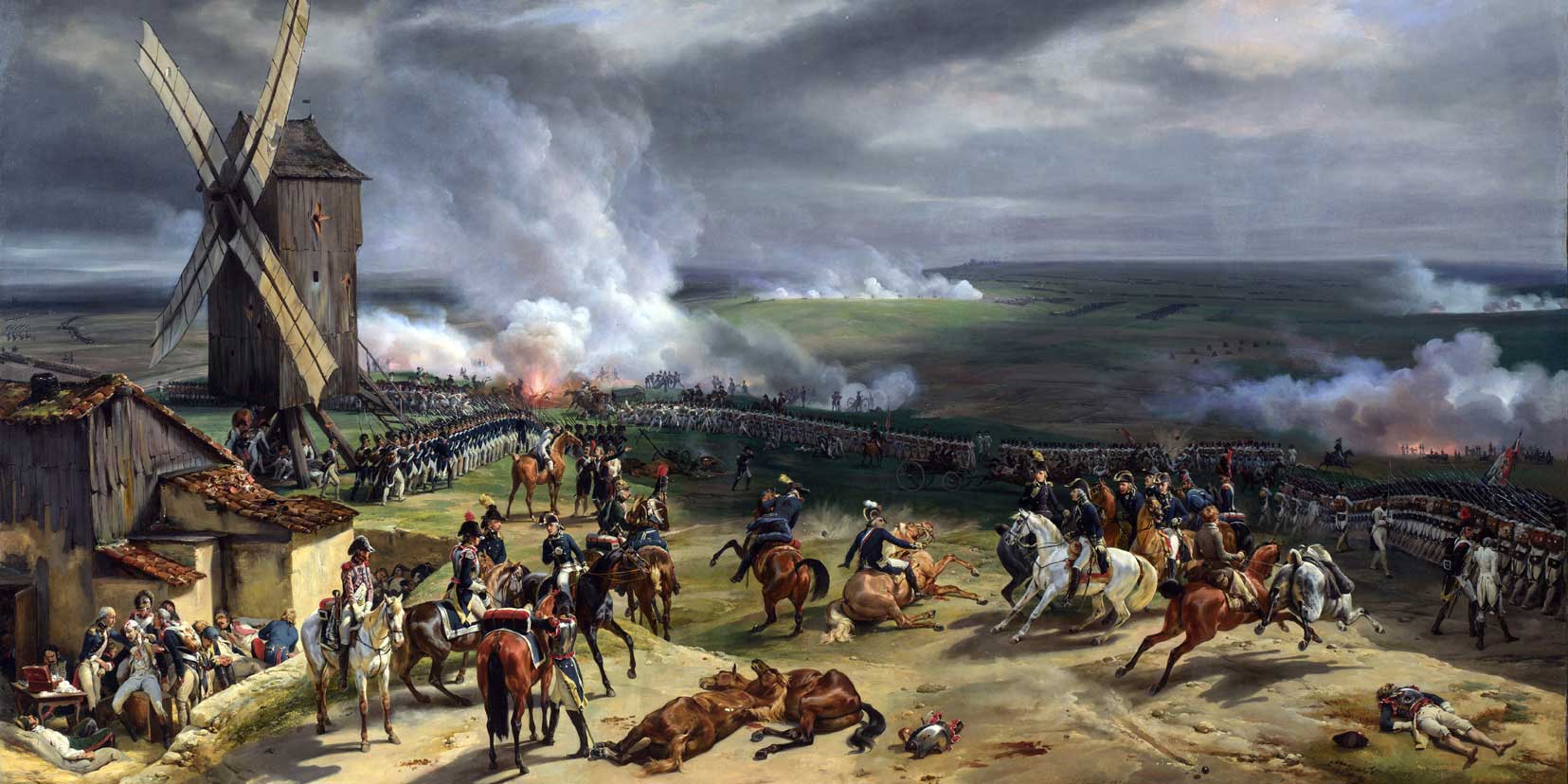
The Battle of Valmy, 10th September 1792 (detail), after H. Vernet, by Jean Baptiste Mauzaisse, 1835. Palace of Versailles, France.
There are still scientists in the West and particularly in America who are attempting to tell the world that the phenomenon we call “global warming” is in fact a perfectly normal, if rare, cyclical event. Perhaps this is true, and perhaps that cycle simply wound around to brutal cold and endemic blight during the Dark Ages, and it is in the process of doing so again now. It seems far more certain, however, that a specific trigger caused the bizarre phenomena associated with the early Dark Ages, just as it seems more likely that the steady degradation of the Earth’s atmosphere during the Industrial Age is behind our current bizarre weather patterns, which are producing many of the same results evident a millennium and a half ago: periods of severe cold (during winters, but at other times as well), crop failures, droughts, pandemics, and, once again, the migration of whole communities toward areas where these problems are less prevalent (or are at least perceived to be less prevalent).
We can form as tight an historical analogy between the period of the barbarian “invasions”—really a series of desperate migrations—of imperial Roman territory and our own era as it is reasonable to expect to find between any two periods separated by so large a gap in time. This leads, then, to the last and most fatal question of all pragmatic counterfactual history: Is there anything that either the Romans or their barbarian neighbors could have done differently in order to have staved off the centuries of suffering, starvation, ignorance, political disintegration, religious tumult, and warfare that is generally conceded as beginning with the Gothic crossing of the Danube at the end of the fourth century?
Unfortunately, this question brings us to the least amusing of possible counterfactual answers, one that has harrowing implications for the contemporary world. In all likelihood, conditions in the Roman Empire and on its frontiers had so deteriorated by the time of the Danube and Rhine crossings that, even had Rome undergone a renaissance of civic and military commitment by its own most prosperous citizens, or had the tribes of northeastern Europe somehow found a way to slow the Hunnish advance into their lands and counterbalance the effects of environmental devastation by making new trade agreements with Rome, both sides would only have been borrowing time, and—if the disastrous conditions on the continent really were caused as much by a natural catastrophe such as a comet’s collision with the earth as by human folly—then even borrowing time would likely not have been a sustainable policy for very long. If environmental factors badly damaged continental food supplies, triggering famines, diseases, and demographic movements of critical magnitude, the fending off of which was beyond the power of any empire or tribe, then curing political arrogance and stupidity, replacing foolish leaders with wise ones, winning rather than losing important battles—none of it could have counteracted the awesome effects of what had happened to the earth.
The parallels to our own situation are self-evident. We have been warned time and again, in recent decades, by the vast majority of responsible scientists specializing in the field, that climatic shift (or global warming) is almost certainly the result of human foolishness, and that it will soon reach—if, indeed, it has not already reached—irreversible proportions. Should such be the case, then it makes little real difference whether George W. Bush withdraws Americans from Iraq in the near or the far term, or if American immigration laws are tightened or liberalized, or whether any other political and military measures are taken. Earth science trumps all human endeavors, and perhaps many Americans are wise to spend as much of their time as frivolously as they do and to ignore history to the extent they have. Perhaps those of us who seek solutions to problems such as the Iraq War and international terrorism really are just rearranging the deck chairs on a ship very much larger than the Titanic. Perhaps the only people whose lives matter right now are those groups of scientists who are busily trying to determine if the ultimate effects of climate shift can be avoided.
This much, at least, can be said: By the time the Romans realized that many of the barbarian tribes on their frontiers were not the frightful demons they took them for and decided to make some common cause with them in the effort to defend Europe from the Huns and their followers, the moment for effective action had already passed. The Huns were checked at Châlons, although they did not depart Europe until they were ready. Their readiness was no doubt assisted by the fact that what they found in Europe was not a united, well-fed, well-supplied enemy, but a continent still torn by civil strife and sinking ever faster into starvation, chaos, war, disease, and religious fervor. It is scant wonder that such plundering nomads as the Huns ultimately decided to turn their horde eastward again and head for the open steppes of Asia.
And in this sense, counterfactual history has, at the last, one piece of advice to offer us: Environmental devastation may be coming—indeed, may be upon us—and that fact may be irreversible. But a planet riven with religious intolerance, political disunity, and avoidable wars will fall prey to the worst effects of that devastation far more quickly and to a far greater extent than will a planet that has at long last decided to make common cause for the mutual good. Europe in the early Dark Ages did not learn this lesson, and it is arguable, again, that—given the centuries-old ways of warlike or merely dissolute life that had been developing among the barbarian tribes and the Romans—any single event can be chosen, the reversal of which would have forestalled the horrors to come, or that any one leader can be selected, whose survival (or death) would have meant a similarly changed set of ensuing circumstances. Hard times were approaching, and could not be stopped; but had they been faced together, could their effects at least have been mitigated? Can they, in the modern era?
It is worth returning, in this context, to Cullen Murphy’s notion that “being American” is the “antidote” for being Rome: a deceptively simple idea, but one which turns out to have important implications. Consider the similarly deceptive simplicity of the approach that Franklin Roosevelt brought to bear on the seemingly intractable problem of the Great Depression: “It is common sense to take a method and try it,” FDR said. “If it fails, admit it frankly and try another. But above all, try something.” This is a line of thinking that has been painfully absent among American leaders of late; but it may be the only way to stem and finally turn the tide of international catastrophes of every stripe that are bearing down on us.
